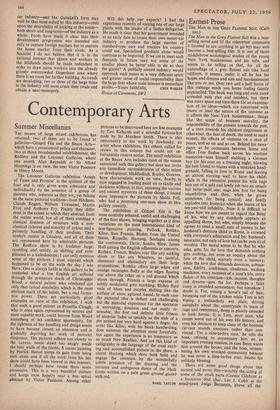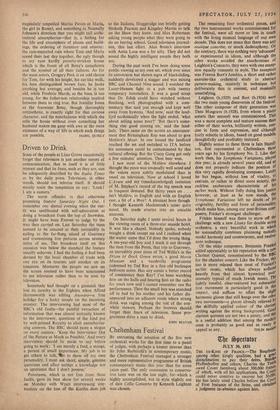Earnest Prose
THE MAN IN THE GREY FLANNEL SUIT. (Carl- ton.) The Man in the Grey Flannel Suit was a best- selling novel and (if the usherettes' comments I listened to are anything to go by) may well become a best-selling film. It is one of those middlebrow sociological studies of the young New York businessman and his wife, and seems to be telling us that, for all the camouflage of a grey flannel suit (the local uniform, it seems), under it all he has his hopes and dreams and sins and inconsistencies like you or me. Over two and a half hours of this message sends you home feeling faintly pummelled. The book was long and even more crowded with plot and incident, but there was more space and time there for an examina- tion of its, ideas—which are concerned with (more or less) the nature of the universe as it affects the New York businessman: things like the scope of business morality, the responsibility of the present towards the past, of a man towards his children (legitimate or otherwise), the fear of death, the need to make money, the effects of violence on a man of peace, and so on and so on. Behind his news- paper as he commutes between home and office Tom flashes back across his wartime memories—sees himself stabbing a German boy for his coat on a freezing night, blowing his best friend to blazes with a mistaken hand- grenade, falling in love in Rome and leaving an almost starving waif to have his child; while in the obtrusive present his wife nags him out of a safe and lowly job into an unsafe but better-paid one; nags him first for being unambitious and then, when he grows ambitious, for being cynical; and finally explodes into hysterics when she learns of his ten-year-old infidelity. Now it is difficult to know how we are meant to regard this Betsy of his, who by any standards appears an appalling shrew, but who, simply because she agrees to send a small sum of money to her husband's destitute child in Rome, is crowned with everyone's admiration and her husband's assurance, not only of love but (as he puts it) of worship. The moral seems to be that he who asks, gets; for the love that demands nothing gets nothing,, not even an inquiry about the fate of the child, scarcely even a memory: while the love that demands devotion, submis- sion, fidelity, confidence, obedience, washing machines, every moment of a man's life, every flicker of his attention—job, income, thoughts and dreams—gets the lot. Perhaps a faint irony is intended somewhere; but somehow I doubt it. For, tossing a horse's tail of hair, bouncing out of the kitchen while Tom is left wiping a melancholy wet plate, driving suicidally about the, countryside in tears of rage and resentment, Betsy is plainly intended to look heroic. It is Tom, poor man, who comes worst out of his own life history, and even his decision to keep clear of the business rat-race sounds uxorious rather than con- vinced. 'I'm a nine-to-five man,' he tells the boss, refusing to accompany him on an important evening mission, in case Betsy wants him around the house; and the boss, remem- bering his own wrecked, domesticity because he was never a nine-to-five man, beams his unlikely blessing.
There are some good things about this earnest and prosy film—notably the acting of some of the small parts (Connie Gilchrist as a ferocious deaf char, Lee J. Cobb as the small-town Judge Bernstein, above all the exquisitely unspoiled Marisa Pavan as Maria, the girl in Rome), and something in Nunnally Johnson's direction that you might call archi- tectural atmospherics—that is, a feeling for the life and atmosphere of places and build- ings, the ordering of furniture and objects: the rain-encircled ruin where Tom and Maria spend their last day together, the ugly though to my eyes hardly poverty-stricken house which is the fount of all Betsy's complaints and the symbol of all their failures. As for the main actors, Gregory Peck is an odd choice for Tom, for with his height, his cat-like walk, his lean distinguished brown face, he looks anything but average; and besides he is too old, while Frederic March, as the boss, is too young, for the father-son relationship implied between them to ring true. But Jennifer Jones as the fearsome Betsy, though thoroughly antipathetic, is exactly right for that curious character, and the nonchalance with which she sells the house without even consulting her husband makes me gasp with awe at the mere existence of a way of life in which such things



































 Previous page
Previous page